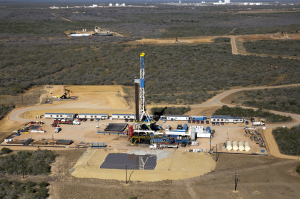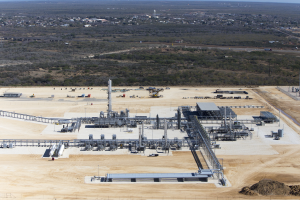The Eagle Ford Shale play in south Texas is the 400-mile-long area that has become home to one of the country’s biggest energy booms in the past six years. The thousands of oil and gas wells producing in the region have brought dangerous air pollution to residents.
The Center for Public Integrity, InsideClimate News and The Weather Channel released a new exposé titled, “Fracking the Eagle Ford Shale: Big Oil & Bad Air on the Texas Prairie,” last week. Their eight month investigation reveals the dangers that come with fracking in the form of toxic chemicals released into the air as a result of the complicit culture of the government of Texas. In case you just want to read the highlights of the report, the team was nice enough to summarize their major findings:
- Texas’ air monitoring system is so flawed that the state knows almost nothing about the extent of the pollution in the Eagle Ford. Only five permanent air monitors are installed in the 20,000-square-mile region, and all are at the fringes of the shale play, far from the heavy drilling areas where emissions are highest.
-
Thousands of oil and gas facilities, including six of the nine production sites near the Buehrings’ house, are allowed to self-audit their emissions without reporting them to the state. The Texas Commission on Environmental Quality (TCEQ), which regulates most air emissions, doesn’t even know some of these facilities exist. An internal agency document acknowledges that the rule allowing this practice “[c]annot be proven to be protective.”
- Companies that break the law are rarely fined. Of the 284 oil and gas industry-related complaints filed with the TCEQ by Eagle Ford residents between Jan. 1, 2010, and Nov. 19, 2013, only two resulted in fines despite 164 documented violations. The largest was just $14,250. (Pending enforcement actions could lead to six more fines).
- The Texas legislature has cut the TCEQ’s budget by a third since the Eagle Ford boom began, from $555 million in 2008 to $372 million in 2014. At the same time, the amount allocated for air monitoring equipment dropped from $1.2 million to $579,000.
- The Eagle Ford boom is feeding an ominous trend: A 100 percent statewide increase in unplanned, toxic air releases associated with oil and gas production since 2009. Known as emission events, these releases are usually caused by human error or faulty equipment.
- Residents of the mostly rural Eagle Ford counties are at a disadvantage even in Texas, because they haven’t been given air quality protections, such as more permanent monitors, provided to the wealthier, more suburban Barnett Shale region near Dallas-Fort Worth.




